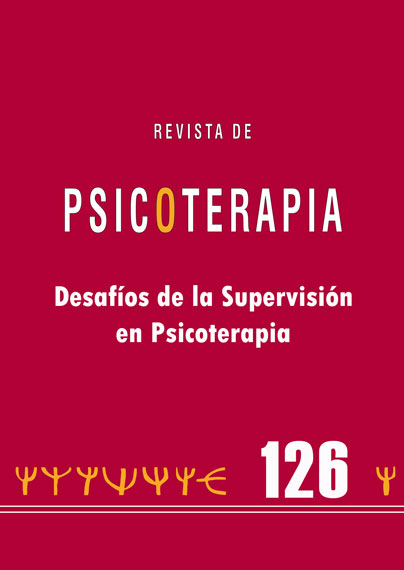Desde ser psicoterapeuta, a ser supervisor clínico
DOI:
https://doi.org/10.5944/rdp.v34i126.38693Palabras clave:
psicoterapeutas, supervisores, educación, entranamiento, autocuidadoResumen
En el presente artículo, la autora enfatiza la importancia de la supervisión clínica para los terapeutas, así como la necesidad de otorgarle a la capacitación de supervisores clínicos, un espacio académico formal de formación en el marco latinoamericano. Basándose en su experiencia clínica y académica en Argentina y Chile, recoge la información que existe en tales contextos acerca de las carencias de apoyo y sustento para quienes inician su carrera profesional como psicoterapeutas, así como la ausencia de espacios formativos de supervisores. El artículo da a conocer una experiencia piloto realizada entre la Universidad Católica de Chile en conjunto con la Universidad de Heidelberg, por supervisores clínicos muy reconocidos, pertenecientes a distintos modelos psicoterapéuticos. Diferentes modelos de supervisión, una metodología de capacitación para futuros supervisores, la apertura al mundo posible de supervisión on line a explorar, la supervisión clínica visualizada como una herramienta de protección y autocuidado para terapeutas y pacientes, son algunos de los aportes que este trabajo nos acerca.
Descargas
Citas
American Psychological Association. (1947). Committee on Training in Clinical Psychology. Recommended graduate training program in clinical psychology [Comité de formación en psicología clínica. Programa de formación de postgrado recomendado en Psicología Clínica]. American Psychologist, 2(12), 539-558. https://doi.org/10.1037/h0058236
Camacho, J. (2003). Sobre el sindrome del burnout o de estar quemado. Fundación Foro para la Salud Mental. http://www.fundación foro.com/pdfs/archivo16.pdf.
Clingerman, T. L. y Bernard, J. M. (2004). An investigation of the use of e-mail as a supplemental modality for clinical supervision [Una investigación sobre el uso del correo electrónico como modalidad complementaria para la supervisión clínica]. Counselor Education and Supervision, 44(2), 82–95. https://doi.org/10.1002/j.1556-6978.2004.tb01862.x
Comisión Nacional de Acreditación de Psicólogos Clínicos Especialistas en Psicoterapia. (2001). Reglamento. https://psicologosarica.files.wordpress.com/2007/11/regl_acreditacion.pdf
Daskal, A. M. (2008). Poniendo la lupa en la supervisión clínica. Revista Argentina de Clínica Psicológica, XVII(3), 215-224.
Daskal, A. M. (2022). La persona del terapeuta (3ª Ed.). Ediciones UC.
Dudding, C. C. y Justice, L. M. (2004). An E-supervision model: videoconferencing as a clinical training tool [Un modelo de E-Supervisión: Videoconferencia como herramienta de entrenamiento clínico]. Communication Disorders Quarterly, 25(3), 145–151. https://doi.org/10.1177/15257401040250030501
Gordon,M. (2000). Clinical Supervision: a concept analysis [Supervisión clínica: un análisis conceptual]. Journal of Advanced Nursing, 31(3), 722-729. https://doi.org/10.1046/j.1365-2648.2000.01329.x
Kämmerer, A. (2007). Seminario Internacional en Supervisión Clínica. Universidad Católica de Chile-Universidad de Heidelberg
Linares, J. L. y Ceberio, M. (2005). Ser y hacer en psicoterapia sistémica. Paidós
Marrow, C. E., Hollyoake, K., Hamer, D. y Kenrick, C. (2002). Clinical supervision using video-conferencing technology: a reflective account [Supervisión clínica utilizando tecnología de videoconferencia: un relato reflexivo]. Journal of Nursing Management, 10, 275-282. https://doi.org/10.1046/j.1365-2834.2002.00313.x
Milne, D. y Oliver, V. (2000) Flexible formats of clinical supervision: Description, evaluation and implementation [Formatos flexibles de supervisión clínica: Descripción, evaluación e implementación]. Journal of Mental Health, 9(3), 291-304. htpp//doi: 10.1080/jmh.9.3.291.304
Rupert, P y Morgan, D. (2005). Work setting and burnout among professional psychologists [Entorno laboral y agotamiento entre psicólogos profesionales]. Professional Psychology: research and practice, 36(5), 554-560. https://doi.org/10.1037/0735-7028.36.5.544
Rupert, P. y Kent, J. (2007). Gender and work setting differences in career-sustaining behaviours and burnout among professional psychologists [Diferencias de género y entorno laboral en comportamientos de sostenimiento de la carrera y agotamiento entre psicólogos profesionales]. Professional Psychology: Research and Practice, 38(1), 88-96. https://doi.org/10.1037/0735-7028.38.1.88
Schaufeli, W. (2006). The balance of give and take: toward a social exchange model of burnout [El equilibrio entre dar y recibir: hacia un modelo de agotamiento basado en el intercambio social]. International Review of Social Psychology, 19(1), 87-131.
Stebnicki, M. A. y Glover, N.M. (2001). E-supervision as a complementary approach to traditional face-to clinical supervision in rehabilitation counseling: Problems and solutions [E-supervisión como enfoque complementario a la supervisión clínica tradicional en asesoramiento en rehabilitación: Problemas y soluciones]. Rehabilitation Education, 15(3), 283–293.
Descargas
Publicado
Cómo citar
Número
Sección
Licencia
Los autores/as que publiquen en esta revista aceptan las siguientes condiciones:
- Los autores/as conservan los derechos de autor y ceden a la revista el derecho de la primera publicación, con el trabajo registrado con la Creative Commons CC-BY-NC 4.0 Internacional, que permite a terceros citar el texto y usarlo sin alterarlo y sin beneficio económico, siempre que mencionen la autoría del trabajo y la primera publicación en esta revista.
- Los autores/as pueden realizar otros acuerdos contractuales independientes y adicionales para la distribución no exclusiva de la versión del artículo publicado en esta revista (p. ej., incluirlo en un repositorio institucional o publicarlo en un libro), siempre que indiquen claramente que el trabajo se publicó por primera vez en esta revista.
- Las opiniones expresadas en los trabajos son responsabilidad única de los/as autores/as, no reflejando en ningún caso las opiniones o políticas científicas de la revista.














